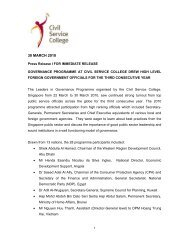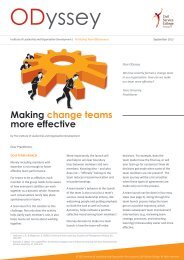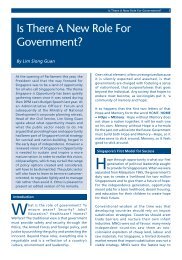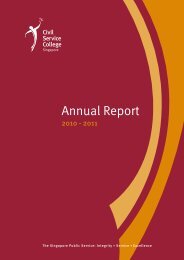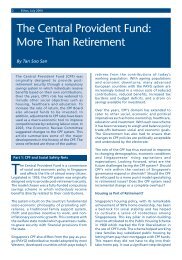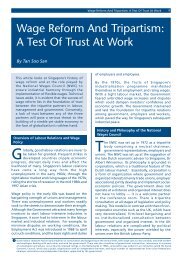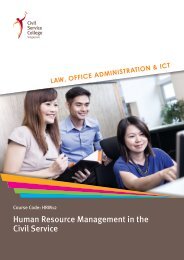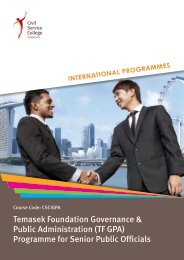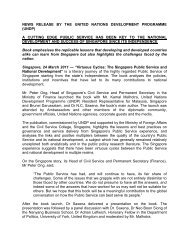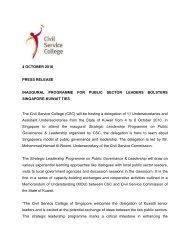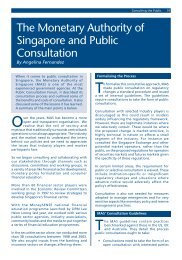Public Consultation Toolkit - Civil Service College
Public Consultation Toolkit - Civil Service College
Public Consultation Toolkit - Civil Service College
Create successful ePaper yourself
Turn your PDF publications into a flip-book with our unique Google optimized e-Paper software.
<strong>Public</strong> <strong>Consultation</strong> <strong>Toolkit</strong> <strong>Public</strong> <strong>Consultation</strong> <strong>Toolkit</strong><br />
1. Introduction<br />
1.1. <strong>Public</strong> consultation in the <strong>Public</strong> <strong>Service</strong><br />
<strong>Public</strong> consultation is a process by which government interacts with the public or stakeholders<br />
to seek input and discuss issues regarding a specific deliverable, which is often either a policy or<br />
initiative.<br />
<strong>Public</strong> consultation as defined here is distinct from public engagement, which refers to the<br />
government’s ongoing involvement with stakeholders or partners, and is not necessarily<br />
focused on a particular policy, initiative or issue.<br />
The key difference between public consultation and public engagement is the driving impetus<br />
behind the activity. While the objective of public consultation is to gather feedback on a specific<br />
issue, the ultimate goal of public engagement is to develop a longer term relationship with<br />
stakeholders.<br />
Case 1:<br />
Regulatory regime for the private education sector – an illustration of public<br />
consultation<br />
Agency/country:<br />
• Ministry of Education (MOE), Singapore<br />
Background:<br />
• The rapid growth of the private education (PE) sector had led to uneven standards across<br />
private educational institutions (PEIs). To address this, MOE proposed to establish a new<br />
regulatory regime to improve standards in the PE sector, to be overseen by a statutory body,<br />
the Council for Private Education.<br />
• The new regulatory regime consists of three key features: (i) an Enhanced Registration<br />
Framework that sets out mandatory standards in the key areas of corporate governance,<br />
academic rigour, and information transparency which PEIs need to adhere to in order to<br />
be allowed to operate their businesses; (ii) a voluntary certification scheme (EduTrust) with<br />
higher and more comprehensive standards to allow quality PEIs to differentiate themselves<br />
from the rest; and (iii) regulatory levers to allow for a range of graduated solutions to match<br />
the severity of breaches.<br />
• A public consultation exercise was conducted from March to May 2009 to seek feedback on<br />
the key principles and features of the new regulatory framework .<br />
<strong>Consultation</strong> Process:<br />
• MOE posted the <strong>Consultation</strong> Paper on its website, with a hyperlink on REACH’s (Reaching<br />
Everyone for Active Citizenry@Home) Portal to widen the reach to the public and<br />
stakeholders.<br />
• An industry briefing was held for PEIs to facilitate their understanding of the key features of<br />
the new regulatory regime. Over 500 PEI representatives attended the briefings.<br />
• Four focus group discussions were conducted with selected PEIs and students whose views<br />
would be representative of their communities. This helped MOE to further unpack the<br />
concerns that have been raised.<br />
Outcomes:<br />
• After the close of the public consultation exercise, MOE evaluated the feedback received and<br />
incorporated several suggestions into the regulatory framework. A summary of responses<br />
to the feedback was also published on the MOE website.<br />
• The Private Education (PE) Bill was also refined based on the feedback received. <strong>Consultation</strong><br />
on the PE Bill was conducted in July 2009 to seek final views.<br />
• The PE Bill was introduced in Parliament in August 2009 and the Second and Third Readings<br />
took place in September 2009. The Private Education Act was finally gazetted in October<br />
2009.<br />
• The Council for Private Education was formally instituted on 1 Dec 2009 as a Statutory Board<br />
under MOE, and it commenced operations of the new regulatory regime on 21 Dec 2009.



